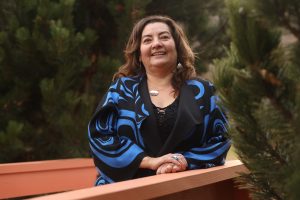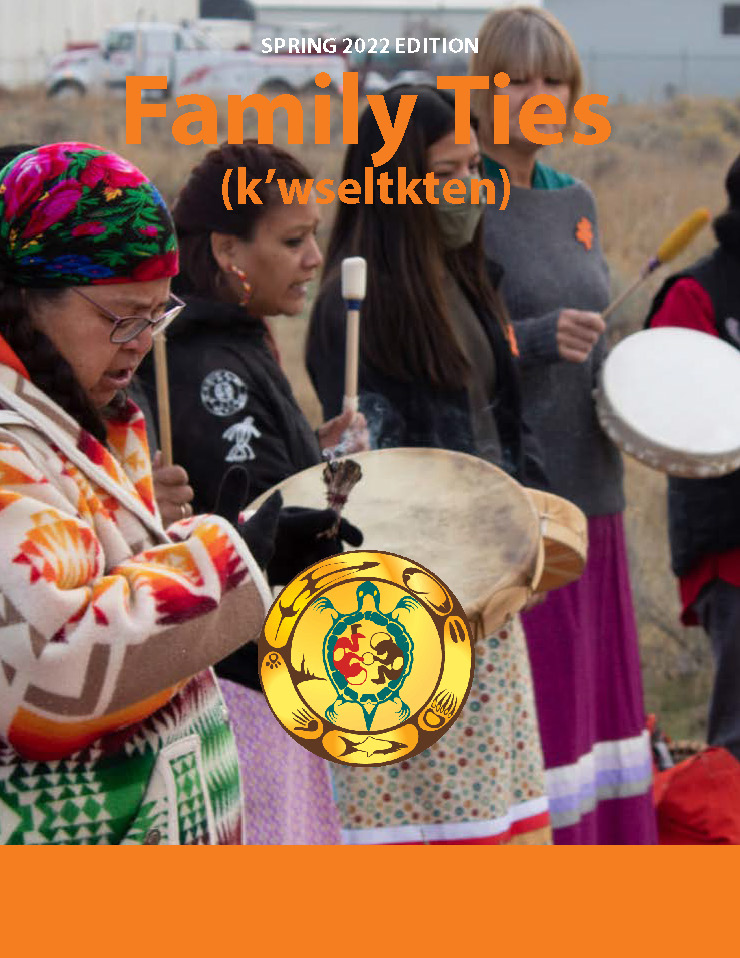 Many of you know Cindy Carusi as our ever-helpful, always cheerful Chief Financial Officer, but many of you might not know how passionate she is about reconnecting with her Secwépemc culture and language.
Many of you know Cindy Carusi as our ever-helpful, always cheerful Chief Financial Officer, but many of you might not know how passionate she is about reconnecting with her Secwépemc culture and language.
She is so passionate about it, in fact, that Cindy takes any chance she can to jump online and learn from the many Secwépemctsin teachers we have in the surrounding area.
An intergenerational survivor, Cindy’s mom was a Residential School survivor who saved Cindy’s sister from the same fate.
Cindy is also our latest winner of the Dr. Cindy Blackstock Award, which you can read about on the last two pages. Dr. Blackstock is also a woman Cindy describes as her hero.
Here’s a bit more about Cindy:
Q: What brought you to the agency?
A: I worked for Shuswap Nation Tribal Council as a student and we did the books for SCFSA. I always wanted to work here.
Q: How many years ago would that be?
A: 16
Q: What did you know about the agency before you were hired?
A: I like the idea of helping children, supporting our First Nations children. Just seeing the potential that people can have with the support, because not everyone has that kind of support in their life.
Q: Can you talk about your own family history?
A: My mom was a Residential School survivor, and she had nine brothers and sisters, all of whom were very close. And her nine brothers and sisters were almost removed by the child-welfare system. But her older sister and her sister’s husband took the kids and ran when they heard the child-welfare officials were on their way. My mom’s mom passed away when she was 14 so her older sister and brother-in-law took on that parenting responsibility.
My mom overcame many challenges having attended Residential School. She held anger, hurt and heartache, and she was still able to prevent my sister from being taken to Residential School. I may not have been taken because I was younger, but my sister for sure would have been taken. My mom took her and ran with her.
Q: Do you have memories of those times?
A: I do have memories from my childhood, both good and challenging ones, but I choose to focus on the good memories. Attending Residential School created a lot of different emotions for my mom, but for the most part she did an amazing job considering what she went through and she did everything she could to protect us. My mom was my best friend and helped me raise my two daughters.
Because of my mom’s experience with Residential School, she didn’t see the value in school. When I was in Grade 7, I quit school and she said, ‘That’s fine. If you don’t want to go there, you don’t have to,’ because she had such bad memories of school. I was allowed to quit school, but I had to go to work. So at 10 I went to work at the Oasis Hotel and then at 12 I went to work at the Husky waitressing a graveyard shift, and she was OK with that. I received my education in life and didn’t graduate from university until I was 40.
Q: What do you like most about your job?
A: I love the idea of what we’re doing for the children and families. I love that we are now able to offer Prevention services. I love the language and the cultural aspect, too, because I missed out on a lot of that as a kid. All of this is new to me, I’ve never had that in my life.
I take pride in making sure that this funding is protected. We want to make sure it goes to our people because that’s who it’s meant for.
Q: You talked about how Dr. Cindy Blackstock is your hero. Can you elaborate?
A: My first boss called us the poor cousins across the river. We had no funding, we couldn’t offer training, and we couldn’t offer raises. MCFD even offered us their used furniture. And then Cindy Blackstock took it upon herself to fight the federal government.
She’s just so fierce. Because of her we have all these programs — the cultural program, increased early years support for children. They say one to six is critical for a child’s development, so now we have a team of people working with our one- to six-year-olds. There are so many little ones who require support and now we can work with them. We couldn’t do that before. We had minimal funding, so we could help a triage of a few children and just skim the top of the need, but we’re doing so much work now and that’s because of her. She went to court but it wasn’t about money for her. It’s about helping our people.
She’s just amazing. She really is.
The Province is still funding our operations based on number of children in care with limited funding to support families and prevent children from entering care and that’s just discriminatory and wrong.


